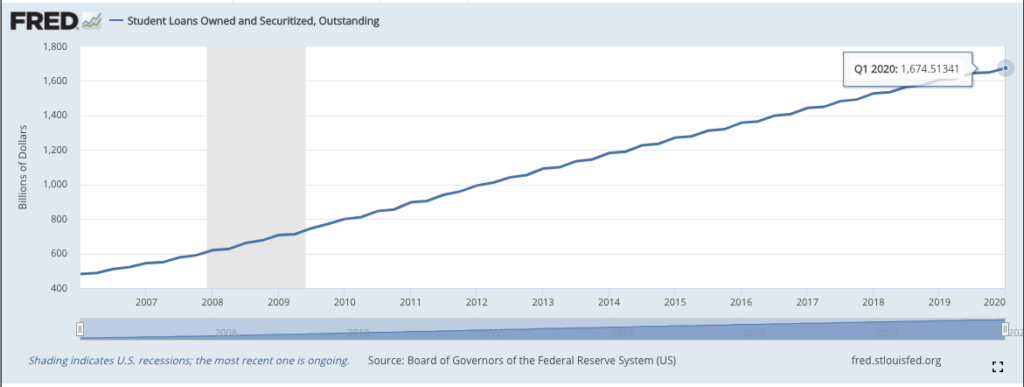In the current economic backdrop, where the median view of economists predict a near 5% year over year decline in GDP (total amount of goods and services produced in the American economy) for 2020 (officially a recession), where both initial and continuing unemployment claims stubbornly loom above their longer run average, and though the economy seems to have bottomed, a recovery back to even a pre-COVID level may be years in the making, as we discussed in Paradise Lost yesterday. Given that economic outlook, and that’s if you assume that the economy wasn’t struggling to maintain growth prior to the COVID-induced shock, could a structural shift in sentiment regarding the value of a college degree be in the cards?
Post-World War II, as a college degree became synonymous with economic prosperity, demand for a college education annually increased despite annually rising costs. Furthermore, 44.7 million Americans have amassed $1.6 Trillion to date in total student loan debt, seeking The Golden Ticket of college education, which doesn’t include the 3.6 million parents who took out $96 billion in parent loans for college, known as PLUS Loans. Many students and parents willingly assumed debt (borrowing from future earnings to fund today’s expenditures), believing that benefits of a college degree outweighed the cost associated with obtaining a student loan.

Unfortunately, simply obtaining a college degree isn’t an iron clad guarantee for a lifetime of dutiful employment. The underemployment rate, or working a job that does not require a college degree, was already 41% for 24-35 year olds, according to the Federal Reserve before the March 2020 COVID-induced economic disruption. Thus, for many students and parents the ability to repay loans may have been hampered by the current economic malaise leading to a delay in household formation (getting married, purchasing a house, having children), which may further diminish sentiment regarding the value of college.
Then, in Spring 2020, as universities pivoted in response to the COVID-19 global health emergency, many current college students and parents were dismayed, some even suing for tuition refunds, as discussed in Students Balk, Lawyers Talk. With the bitter aftertaste of summarily being evicted from campus in Spring 2020, and furthermore having to subsequently endure distance learning instruction, more aptly called, “Emergency Learning” often with dubious quality, many parents and students will begin the 2020-21 school year with a greater degree of trepidation.
One Georgetown second year student, believes the recent 10% tuition discount to account for the lack of a residential experience in Fall 2020 isn’t enough. During her first year, she discussed politics with multiple presidential candidates while learning the responsibility of freedom living in Washington DC. Now, frustrated by the limited worldview of her computer screen while residing in her suburban Northern California tract home, she questions if she’s meriting an education worthy of the $25,823.00 tuition for the Fall 2020 semester.
Even for students who will learn and live on-campuses, which according to The Chronicle of Higher Education is only 48% of all universities as of July 28, 2020, down from 60% as of July 6, 2020, will be confronted by a radically altered college reality than experienced prior to March 2020 or anticipated to be experienced for the first time.
And, it won’t just be noticable in the dining commons, but even more importantly, the sense of community and camaraderie which many students rank as one of the more important reasons for attending college in the first place. From attending fall football games to participating in other sports as well as perennial college events, like fall Greek rush, or even late night dorm floor political discussions, students will be restricted, if not outright suspended, for at least the fall semester.
In addition, if more college-related COVID clusters make the news, as discussed in The COVID-Induced College Conundrum, college administrators may also field increasingly vocal critiques from local government officials and public health administrators about repopulating campuses, increasing the possibility of once again needing to close college campuses leaving parents and students in a lurch and disappointed to boot risking further degradation of sentiment.
Can college administrators, especially given that year after year record numbers of applicants willingly apply and if accepted, pay a steadily increasing tuition, even begin to contemplate the possibility that sentiment regarding a college degree can decline? And for those few administrators willing to contemplate the idea of peak sentiment, will they have the time, given the near impossible situation this upcoming school year regarding the unprecedented disruptions to normal operations associated with COVID-19 they will have to manage?
Nothing goes up forever, including sentiment regarding the value of a college education, though a decline in sentiment doesn’t portend an irreversible decline in college going rates. Declining sentiment though if indeed is on the horizon is more a call to action than unnecessary fear-mongering. COVID-19 will come to pass, though the need for all involved to consistently challenge the status quo in search for quality in a college education that although can never be achieved yet no matter how difficult the journey should fearlessly be undertaken, so the upward trend in college sentiment, although may necessarily dip in the short term, will remain intact.
To learn more how experts at Creative Marbles Consultancy, a full service educational advisory, help families resolve complex educational concerns, click creativemarbles.com



